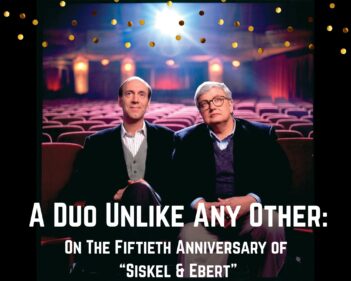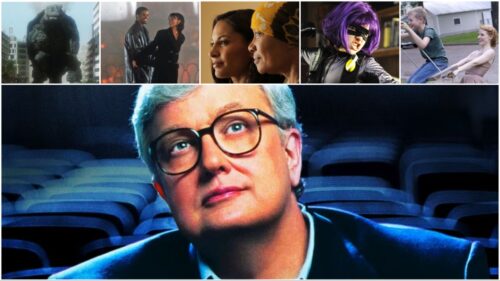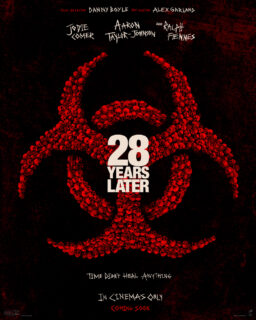The cliche is: In the 1950s in America, we were all a little like Ozzie and Harriet. In the decadent 1990s, we’re descending into armageddon. Gary Ross’ new film “Pleasantville” argues the opposite: In the 1950s we were leading blinkered lives, but it’s been steady progress ever since, into today’s society where change is seen as an opportunity, not a threat.
“It’s an anti-cynical movie,” Ross was telling me. “It strips you of some armor.”
The movie, one of this year’s top Oscar contenders and the weekend’s No. 1 film at the box office, opens in the present, with a teenage brother and sister fighting over the channel-changer. Folksy old Don Knotts comes along and offers them a unit with more “oomph,” and – zap! – they’ve been magically transported into one of those 1950s sitcoms where father knows best. But the kids bring along the seeds of change, and before long people and paintings and flowers are turning from black-and-white into full color, as they realize their inner potential.
Magical transformations are at the heart of all of Gary Ross’ films. As a writer, he wrote “Big,” in which Tom Hanks played a kid who found himself inside the body of an adult, and “Dave,” in which Kevin Kline played a man who looked like the president of the United States, was recruited to work as his double – and then eerily found himself being mistaken for the real thing.
Now comes Ross’ first film as a director, one of those movies that starts out like a predictable comedy and then gets deeper and better until by the end, we’re kind of astonished by how far we’ve been taken. It’s a comic social fable like “Forrest Gump,” where the message develops sneakily from the material. It’s the best kind of commentary, subversive in a palatable way, just like Orwell’s Animal Farm.
“Yeah, it’s intentionally kind of Orwellian,” Ross said. “It starts out as a little parable and then it starts undercutting things.”
We were having tea one afternoon during the recent Chicago International Film Festival, where the movie played on its way to its current engagements around the country. Ross is one of these guys you picture in a home workshop, building everything himself, and he was proud of the special effects that allowed “Pleasantville” to create that world of black-and-white being gradually assaulted by color. In many frames, one character will be color, the world will be black-and-white – and that isn’t as easy to do as it might seem.
“This is more digital than any movie ever made,” he said, “and it was all done right in my office. Home-grown. We bought and rented equipment and hired the right people. Which just shows how special effects have been . . . democratized.”
Yeah. Because they used to cost millions and be done by geniuses in white lab coats, and Ross was claiming he had 1,700 special-effects shots in the movie (as compared to 500 in “Titanic“), and it cost only about 10 percent of his budget.
“Basically I’m shooting in color and then I’m desaturating the environment around the color to create black-and-white. But we had to make it look like real black-and-white. If you just desaturate color film, it looks terrible. It looks flat.
“So we electronically amp up the contrast, so you get the richer blacks and whiter whites – so it pops. You have to hard-light the sections of the frame that are black-and-white so it looks like an old black-and-white movie while we soft-light the parts of the frame that are color, you know . . .”
Well, not exactly. But I get the drift, and I like his enthusiasm as he describes how he created the film’s unique look. “I mean, these people in color are becoming more real, not less, right? So if we just used the old colorization method of shooting in black-and-white and applying cover on top of it, that would look pasty and phony.”
“Pleasantville” combines color and black-and-white so effectively, indeed, that the effects stop being effects and become the world of the film. And we begin to figure out the principle by which some people turn into color and others remain black-and-white.
It’s not just a sexual awakening, although that accounts for the transformation of the 1950s sitcom housewife played by Joan Allen. It can also be artistic inspiration (as with the soda jerk who wants to be a painter, played by Jeff Daniels), or it can be sudden insights, or new knowledge pumped in from outside.
The underlying message is that in the 1950s things seemed hunky-dory because everyone conspired to agree that they were. But then comes a moment when there’s a little Dave Brubeck on the soundtrack, and things start to loosen up, and the future starts to invent itself.
“Social oppression is just an extension of things we’re afraid of in ourselves,” Ross said. “It goes deeper, in some ways, than any of the isms – sexism, racism, fascism. We project our own fear or self-loathing on other people. In a conflict-free environment, everyone is your neighbor and everyone can smile. It’s when your fears become tested, when you’re faced with change, that society opens up.” Joan Allen and William H. Macy, the Chicago-trained actors chosen to play the complacent 1950s married couple, find themselves at the cutting edge of change in the movie. She embraces it, he fears it. Ross liked working with them. “She’s the most self-effacing actor I’ve ever met,” he said. “She’s shy. I’ve never met a shy actor before. She’s able to go to this place where she’s demure, and then she breaks loose. There’s no limitation on what she can do. She looks so right cooking in pearls. And then Bill has that patriarchal thing going in; that square jaw kind of voice and then he’s a great actor beneath it.”
There may be Oscar nominations for them, and the film. When I observed that “Pleasantville” was opening in autumn, which is said to be Oscar season, Ross smiled, sipped his tea, and said, “I can’t say it’s an accident.”











